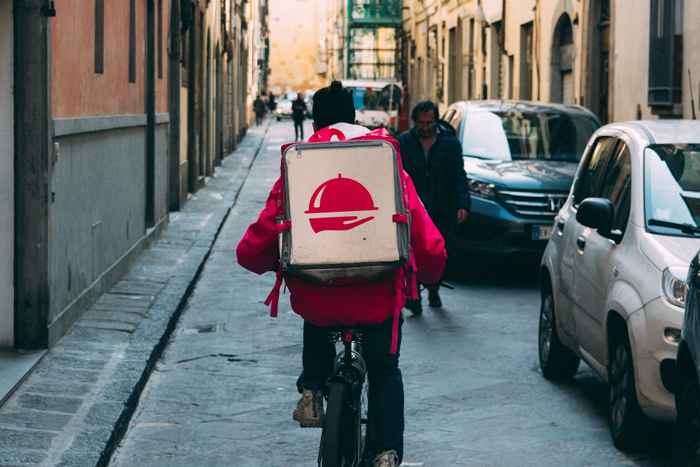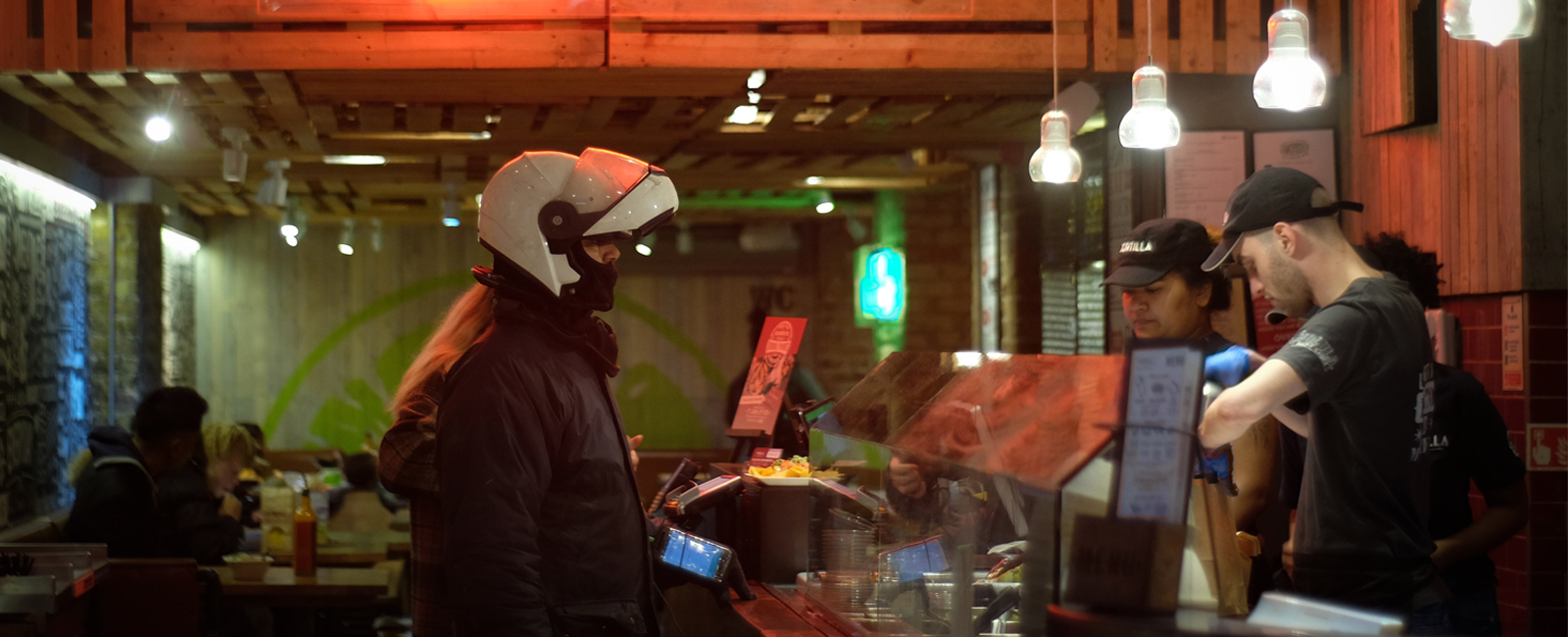Is it safe yet to order takeout food during coronavirus crisis?

KARACHI: The coronavirus lockdown has forced a lot of people to restructure their dietary habits. Amid a ban on food deliveries, people have taken to social media to pour out their emotions, engaging in Twitter battles over which fast-food chain has the better burgers.
Pakistanis are a people who thrive on food, which is also an important part of the culture of all the provinces. In large urban areas, takeout restaurants have always been popular. With the advent of food delivery apps in recent years, ordering food at home has become even easier.
As the country prepares for an easing of restrictions imposed to contain the spread of the novel coronavirus, many eateries and local restaurants have been allowed to resume business.
But one question remains: Is it safe yet to order takeout food?

And for that, Geo.tv spoke to some food and health industry stakeholders and experts to figure out if it's okay to eat food ordered online and whether the coronavirus can be transmitted through the delicious meals prepared in the more-often-than-not overcrowded kitchens of the restaurants.
What is Sindh Food Authority doing?
Speaking to Geo.tv, Sindh Food Authority (SFA) spokesperson Danish Arshad said the body has issued its standard operating procedures (SOPs) to both riders delivering food, as well as restaurants and eateries, to ensure protection from the coronavirus.
Noting that the SFA has shared the SOPs with the media, Arshad said: "We will start conducting inspections from tomorrow."
The guidelines, a copy of which is available with Geo.tv, have been recommended by a scientific panel. Included in their SOPs are the 20-second hand-washing routine before delivery, disinfection of bike handles and delivery bags, maintaining distance with customers, and using electronic receipts and payment methods.
If, however, the mode of payment is cash, it is to be ensured that exact amount is paid so as to avoid back-and-forth of change. Delivery companies are advised not to include people over 55 years of age on their teams and to make sure riders wore masks.
Inside the kitchens
The SFA has directed hotels and restaurants to guarantee availability of liquid soap, sanitiser, and dryer in washing areas. It has further advised that it must be ensure employees, especially kitchen staff, wash their hands after using the toilet, sneezing or coughing, before going to the production area, after waste disposal, before and after exchanging cash, eating food, handling any animals, and cleaning and washing red and white meat (those with high protein).
The kitchen personnel have to wear head cover, masks, and gloves — preferably for single use — and disinfect counters, table tops, entrances, food contact surfaces, and cutting boards.
One crucial instruction was to make sure that food was cooked properly, especially if it included meat or eggs.
All restaurants, hotels, and delivery companies have been asked to ensure food was maintained at preset temperatures, that their employees maintain cleanliness, sanitise their hands, and have trimmed nails. Temperatures using infrared thermometer of all food delivery employees and operators was to be measured and recorded daily, as per the SFA.
Delivery apps
A spokesperson for Careem's food delivery service, Careem NOW, told Geo.tv the company has issued additional instructions in line with the SOPs set by the Sindh government. It will only resume operations with restaurants that have obtained permission from the Sindh government and local authorities.
The company has made it obligatory for its captains to wear masks and gloves "at all times" and use hand sanitisers. "Captains should place parcels at the customer's doorstep, wipe with a disinfectant swab and step back," the spokesperson said in an email to Geo.tv.
It was also reminding its employees, including captains, and customers about safety precautions and its implementation and was ensuring awareness-related communications.
Checking up on riders
To facilitate its own employees, the delivery people, Careem has implemented "financial support as “Sick Pay Policy’ for two weeks to any Careem Captain who is diagnosed with COVID-19 or placed in individual quarantine by a public health authority".
It has also offered health insurance, with low-cost option starting from Rs163-569 a month, which "covers hospitalization and ICU admission in case the captain or their family members are tested positive for COVID-19 or are diagnosed with any other disease", the spokesperson added.
The app also mandated that in cities where ride-hailing is open on a limited scale, only one customer — and two only in medical emergencies — would be allowed to travel on a Careem bike.
Foodpanda, another food delivery service, did not respond to Geo.tv's request for a comment.
'Don't want to risk it'
Geo.tv also spoke with Faisal J Khan, the owner of Oh My Grill, a flame-grilled burger chain, which has resumed its kitchen and delivery services.
"We're keeping the staff at a bare minimum and to instil confidence, I'm present at at least one location [because I don't want them to feel I've thrown out to the dogs in a very dangerous situation," Khan said, adding that he monitors his employees hygiene constantly and has already provided hairnets, masks, and gloves, which he said was "already standard as it is".
He mentioned that his burger join had handed masks to riders as well, monitoring that they are "constantly washing their hands and changing their gloves every one hour".
"In a kitchen, it's difficult to maintain a distance but we try our best and these are the basic measures as recommended by the government and international standard. ... If I hear that someone [in the kitchen] even coughs or chokes, I ask them to go home, I don't want to risk it," Khan added.
'WhatsApp group'
His eatery had received intimation from the district commissioner and was "in the process of registering with the DC", he said, adding that it was already registered with the SFA. However, he lamented how communication from the provincial government only ended up reaching the relevant stakeholders through WhatsApp.
"We've formed a WhatsApp group and there is representation from the All Pakistan Restaurant Association (APRA). We all add in our two cents and come up with best practices," he said, explaining that if one of his peers had worked abroad, they would share their techniques and methods to bump up local standards.
Geo.tv also reached out to two barbeque restaurants but was unable to obtain a comment from them.
Int'l bodies and recommendations
Separately, the World Health Organization (WHO), in its April 8 situation report, released a food safety guideline called: 'COVID-19 and Food Safety: Guidance for Food Businesses'.
"It is highly unlikely that people can contract COVID-19 from food or food packaging," it said. "There is no evidence to date of viruses that cause respiratory illnesses being transmitted via food or food packaging. Coronaviruses cannot multiply in food; they need an animal or human host to multiply."
It also specifically mentioned that food companies should develop a "delivery system that reduces contacts with food deliverers and avoid employee lines" and that everyone should generally avoid "unprotected contact with farm or wild animals".
The Centers for Disease Control and Prevention (CDC) in the US said in a newsletter that there was "no evidence to support transmission of COVID-19 associated with food".
"In general, because of poor survivability of these coronaviruses on surfaces, there is likely very low risk of spread from food products or packaging that are shipped over a period of days or weeks at ambient, refrigerated, or frozen temperatures," it added.
On the other hand, the US Food and Drug Authority (FDA) said: "SARS-CoV-2, which causes COVID-19, is a virus that causes respiratory, not gastrointestinal, illness.
"Foodborne exposure to this virus is not known to be a route of transmission," it added.
The FDA has also shared best practices for retail food stores, restaurants, and pick-up and delivery services. It includes information on safe handling of food, guidelines on cleaning and sanitising for everyone, and use of personal protective equipment (PPEs).
Still worried?
With regard to people's worries, scientists and researchers have also spoken up.
Dr Donald W. Schaffner, an extension specialist in food science and Distinguished Professor at Rutgers University, told NPR it was "safe" to eat takeout food.
"I know people are worried, but from what we know currently about the virus, it's safe to eat food prepared at restaurants so long as you take the proper precautions — in particular hand-washing," Schaffner, whose research interests include predictive food microbiology, handwashing, and cross-contamination, told the publication.
An associate professor of microbiology at the University of Southern California's (USC) Keck School of Medicine, Paula Cannon, told MarketPlace that as a virologist, she was "not worried at all" that there could be anything on the delivery packages or food containers.
However, "it’s totally OK to be a bit freaked out. I’m not going to criticize anybody for that, and it’s OK to be, you know, kind of a bit of an obsessive sort of hypochondriac at the moment,” she told the publication.
American physician and former health commissioner of Baltimore, Leana Wen, told CNET that there was no evidence of transmission of the novel coronavirus through food.
But since "the virus can live on instruments that people touch, including takeout containers and utensils", people should make sure to wash hands after touching food containers and before eating.
Options that can be implemented in Pakistan
Food delivery apps abroad are offering various innovative methods to reduce even the minimal contact with delivery people, including options such as "Leave at my door delivery" and "No contact delivery" or "Contact-free delivery," which could be implemented here in the Pakistani market as well.
Regardless, customers in Pakistan can come up with customised methods, such as asking the delivery people to leave the food somewhere near your doorstep or in the apartments while they place the cash nearby or speak to the riders to arrange meet-up before the actual delivery. It is also advisable not to use the plastic cutlery that comes inside the food package.
In any case, always make sure to tip the delivery people well as they are working to provide you food in the comfort of home. Wash your hands and enjoy!
COVER PHOTO: Unsplash/Viktor Forgacs/via Geo.tv




